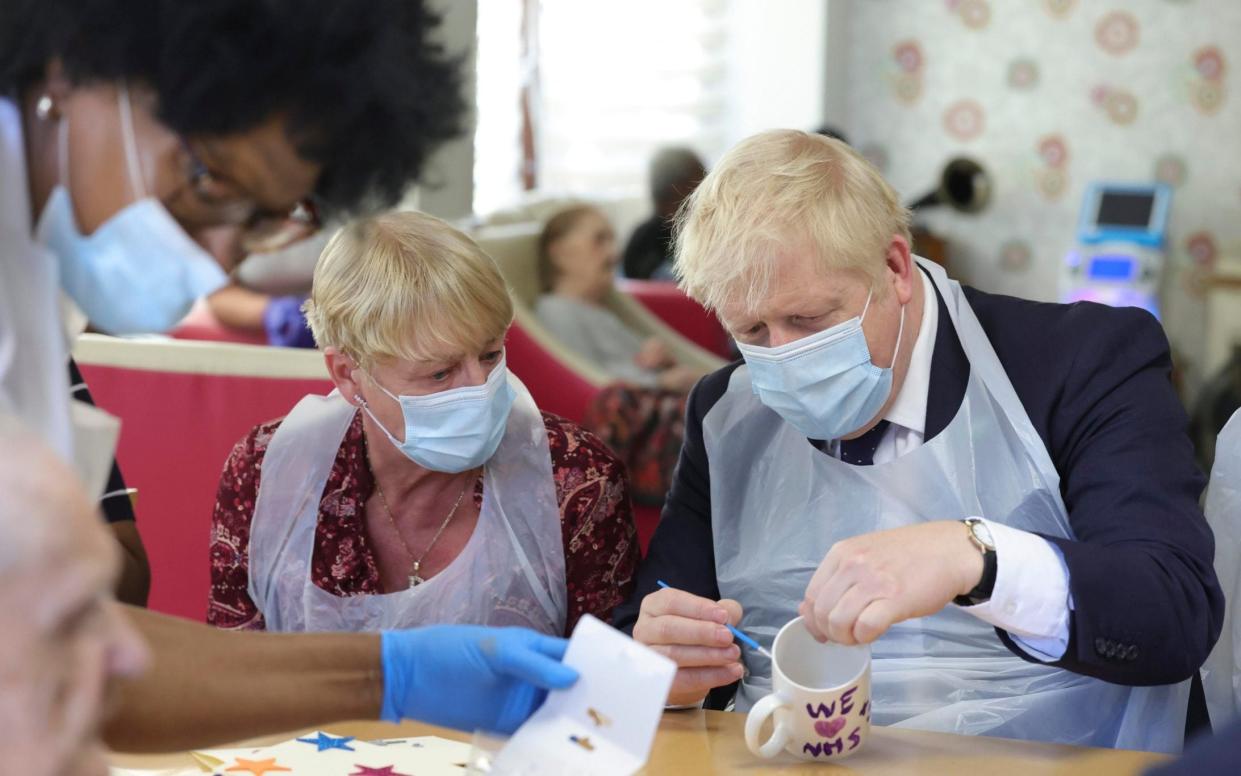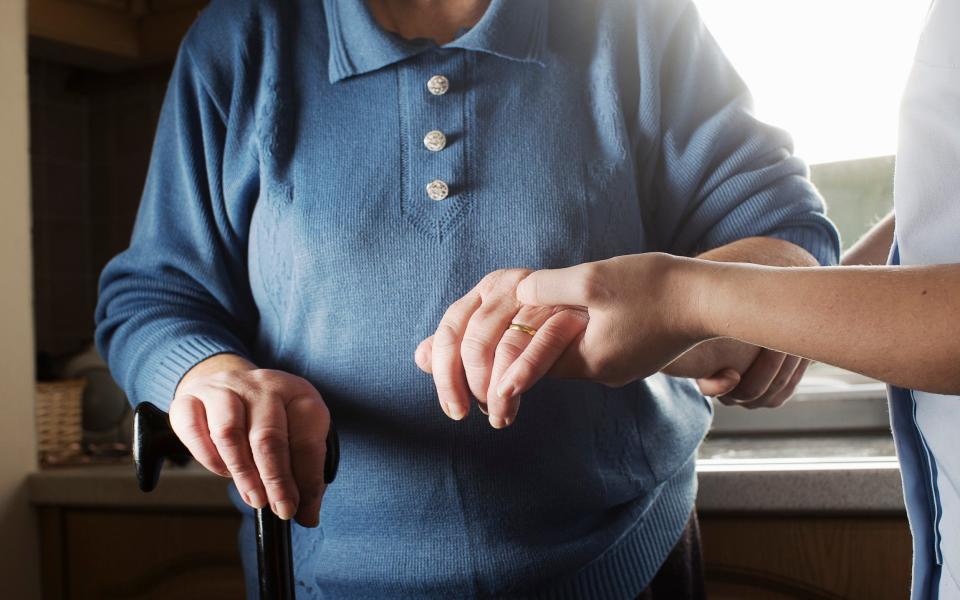Social care boss warns basic services will collapse without an urgent new Government plan

Tens of thousands of elderly people risk not being able to eat, wash or dress unless their loved ones give up work to help, a care boss has told The Telegraph.
Stephen Chandler, president of the Association of Directors of Adult Social Services (ADASS), a charity representing the directors of adult social services in England, issued the stark warning about the state of the sector ahead of winter if a solution to the staffing crisis and more funding are not found.
Writing on the Telegraph website, he said: “Unless the government takes immediate steps to shore up the care system for winter, tens of thousands of people will lose services on which they rely to get up, wash and dress, eat and drink, take vital medication, go out to work or to other activities and go to bed.

“Family carers, already exhausted by the extra demands of Covid, will have to do even more to plug the gaps and may have to cut their working hours or give up jobs altogether. The NHS, which depends utterly on social care support, will be put in jeopardy.”
He also warned that older people will be “waiting – sometimes in distress - for overstretched care”.
His comments come just weeks after Mike Padgham, chairman of the Independent Care Group for York and North Yorkshire and owner of Saint Cecilia’s Care Services, which operates four care businesses, asked relatives of residents to volunteer to work on reception and serve meals if the Government’s mandatory vaccination policy for carers saw staffing levels plunge to crisis point.
Staffing pressures are mounting
Mr Chandler, who is also Oxfordshire County Council’s director of adult services and housing services, warned that workforce pressures are continuing to mount and urged the Government to reveal its plans for winter.
It is understood that the Department for Health and Social Care (DHSC) is currently preparing a winter care plan to equip services to handle both the coronavirus and flu.
However, local authorities have not yet been informed of any details, with one source saying: “Our assumption is that either nothing is happening or there is work underway to flesh out more meaningful actions”.
Last month, Prime Minister Boris Johnson unveiled a controversial National Insurance tax increase to help fund the embattled sector, as well as a lifetime cap on social care costs of £86,000 per person. However, the cap only applies to "personal care" costs, not "hotel costs" such as accommodation, cleaning and food, which often account for the bulk of the care bill.
Mr Chandler said that while the cap was “welcome”, it “will not of itself deliver an extra pound to improve the quality of care and support or make it more accessible to the millions of us who need it”.
“It won’t add a penny to the pay of care staff and it won’t stabilise a system that is showing alarming signs of collapse as the nights draw in."
A Department of Health and Social Care spokesperson said: “We are working closely with the NHS and social care sector to ensure that planning for this coming winter is co-ordinated and integrated.
“We have invested over £388 million this winter into adult social care to prevent the spread of infection in social care settings, including £25 million to support care workers to access COVID-19 and flu vaccines.
“In the long term, we are committed to the delivery of world-leading social care for everyone who needs it. The new £5.4 billion funding for the sector will put in place comprehensive reforms that are sustainable and fit for the future.”
Government needs to act quickly and urgently to get the country through the winter
After 25 years of indecision by our politicians, nobody should underestimate the importance of hearing a prime minister commit and recommit his government to “get social care done”. But as winter approaches, does Boris Johnson understand just how quickly and decisively he must act?
The announcement of a cap on personal liability for care costs in England was welcome confirmation that the tectonic plates of reform are shifting. But the cap, combined with the promise of a more generous means test, will not of itself deliver an extra pound to improve the quality of care and support or make it more accessible to the millions of us who need it. It won’t add a penny to the pay of care staff and it won’t stabilise a system that is showing alarming signs of collapse as the nights draw in.
Directors of adult social services up and down the country are expressing unprecedented concern about their ability to sustain services. This is because of people’s growing needs and a workforce crisis that is forcing provider agencies to decline new referrals, or even hand back contracts they cannot fulfil, and it is leaving disabled and older people waiting – sometimes in distress - for overstretched care staff who arrive late through no fault of their own.

It is by no means to blame our health partners also to point out that social care has stepped up throughout the pandemic to plug gaps that have understandably appeared in primary, community and acute NHS services. Many people are being supported while they wait for NHS treatment.
Unless the government takes immediate steps to shore up the care system for winter, tens of thousands of people will lose services on which they rely to get up, wash and dress, eat and drink, take vital medication, go out to work or to other activities and go to bed. Family carers, already exhausted by the extra demands of Covid, will have to do even more to plug the gaps and may have to cut their working hours or give up jobs altogether. The NHS, which depends utterly on social care support, will be put in jeopardy.
Repeating a grave error
If we learned anything from the first months of the pandemic, it was surely the folly of concentrating on hospitals at the expense of wider health and care. The government’s decision to give hospitals the lion’s share of the resources it plans to raise over the next three years through the health and social care levy risks repeating that grave error.
We urgently need a plan for social care to get us through the winter. It must be comprehensive, addressing not only the workforce crisis but also the needs of worn-out family carers and of the alarming numbers of people reporting mental ill-health and domestic abuse as a result of Covid pressures. If we are given the tools to help them in the community, then the chances of them turning up at A&E will be greatly reduced.
We estimate that we need some £1.5billion to shore up the creaking care system without delay. The same again would underwrite a significant package of support for unpaid carers, including extra payments for those most hard-pressed to take a break to recharge their batteries. But just as important as the funding is the vision – a vision we want to see underpin the forthcoming white papers on social care reform and integration of health and care.
That vision needs to signal an historic shift of focus from acute hospital care and costly residential support to services in the community and to preventing people’s dependency in the first place. A winter plan for social care that embraced such thinking would be a fine start.
Stephen Chandler is president of the Association of Directors of Adult Social Services

 Yahoo News
Yahoo News 
